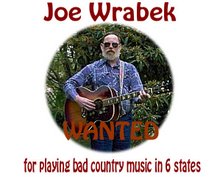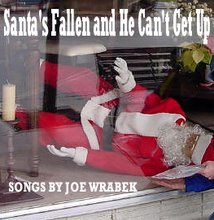Watched an instructional video on “How to Write Christmas Songs.” (It was free. Wouldn’t have watched it otherwise.) It was annoying in part because of the mechanical approach—it assumed all you had to do is write down a bunch of words and phrases with the right imagery, string them together, and voila! Instant Christmas song!
I realize a lot of people do sit down to write deliberately (and I’ve always been impressed by their ability to do that). There are numerous organized exercises for that: the FAWM (February is Album Writing Month), the 50-songs-in-90-days challenge, the November Novel… The premise behind all of those is practice writing—if you produce enough volume, something’s likely to be good—and you will get better at what you do. I don’t argue with the approach. I just don’t work that way myself. I insist on waiting for inspiration to bite (and ideally, draw blood). And I’m more interested in achieving perfection consistently (and don’t mind taking time with it) rather than cluttering my brain with a lot of disposable material. But that’s just me. I am not about to force my peccadilloes on anybody else.
What I found frustrating about the instructional video, though, was that it ignored Wrabek’s Rule Four: Be different—either be saying something new or be saying something old in a new way. Christmas songs are a big challenge, because you have to work with a very limited standard imagery set. If you’re not asking, “How can I do this differently?” what you end up with is more of the Same Old Stuff That’s Already Been Done. And you’re not likely to get attention if you’re just replicating what somebody else (in all likelihood, somebody more established and more famous than you) already did (and probably did better than you).
A couple of cases in point: a pair of Christmas songs by a pair of ex-Beatles, Paul McCartney and John Lennon. McCartney’s “Simply Having a Wonderful Christmastime” says precisely nothing at all, and says it pretty conventionally to boot. Yes, sappiness obviously sells—but you folks who are just stringing conventional images together into Christmas songs, there’s your competition. Why would people purchase your song over Sir Paul’s? Lennon’s “Happy Christmas (War Is Over),” on the other hand, shouts “I’m different!” If what you’ve got is different, you have given people a reason to purchase your song, irrespective of how established or famous you are.
My Christmas songs are all un-normal. We have dead animals (though “Dead Dog” is about giving, and “Even Roadkill Gets the Blues” about wishes that don’t come true), we torpedo icons (“Santa’s Fallen and He Can’t Get Up”), we have an unconventional Christmas—in jail (Don Varnell’s “Another Crappy Christmas,” which I musicated), we address the problem of getting kids to bed Christmas Eve (“Chipmunks Roasting on an Open Fire”) and what an adult might write Santa for (“I Want a Man for Christmas”). I don’t know as I could say any of them were written deliberately—though I had reasons to do all of them, and to have them done in time for their respective Christmases. Different? I always find it useful to ask, “Can I say that with dead animals?”—even though the song in question may not come out that way.
And they do get attention. “I’m Giving Mom a Dead Dog for Christmas” has been sung by Christmas carolers (scary, true, but it does have a very singable chorus); “Santa’s Fallen” ended up on a Philippine album of Christmas songs (it’s the only song of mine ever published by an outside publisher); and “Chipmunks Roasting on an Open Fire” was played on the radio yesterday. A stringing-together of conventional images might not have any of those things happen.
Because that’s the other default one has to contend with in Christmas songs. The good ones have staying power. Some of them have been around for years (some for hundreds of years), which isn’t true of much other popular music. You hear them over and over again every Christmas. When famous singers put out Christmas albums (they all do, sooner or later), they don’t cover new songs—they do the “classics.” It’s a big database, and a hard one to make it into. One of the most recent songs that did get added to that database was “Grandma Got Run Over by a Reindeer.” It was different, that one. One should be different.
Joe
WELCOME...
This blog is the outgrowth of a songwriting workshop I conducted at the 2006 "Moograss" Bluegrass Festival in Tillamook, Oregon. It presumes that after 30-odd years of writing and playing music, I might have something to contribute that others might take advantage of. If not, it may be at least a record of an entertaining journey, and a list of mistakes others may be able to avoid repeating.
This blog is intended to be updated weekly. In addition to discussions about WRITING, it will discuss PROMOTION--perhaps the biggest challenge for a writer today--as well as provide UPDATES on continuing PROJECTS, dates and venues for CONCERTS as they happen, how and where to get THE LATEST CD, the LINKS to sites where LATEST SONGS are posted, and a way to E-MAIL ME if you've a mind to.
Not all these features will show up right away. Like songwriting itself, this is a work in progress. What isn't here now will be here eventually. Thank you for your interest and your support.
Subscribe to:
Post Comments (Atom)



No comments:
Post a Comment